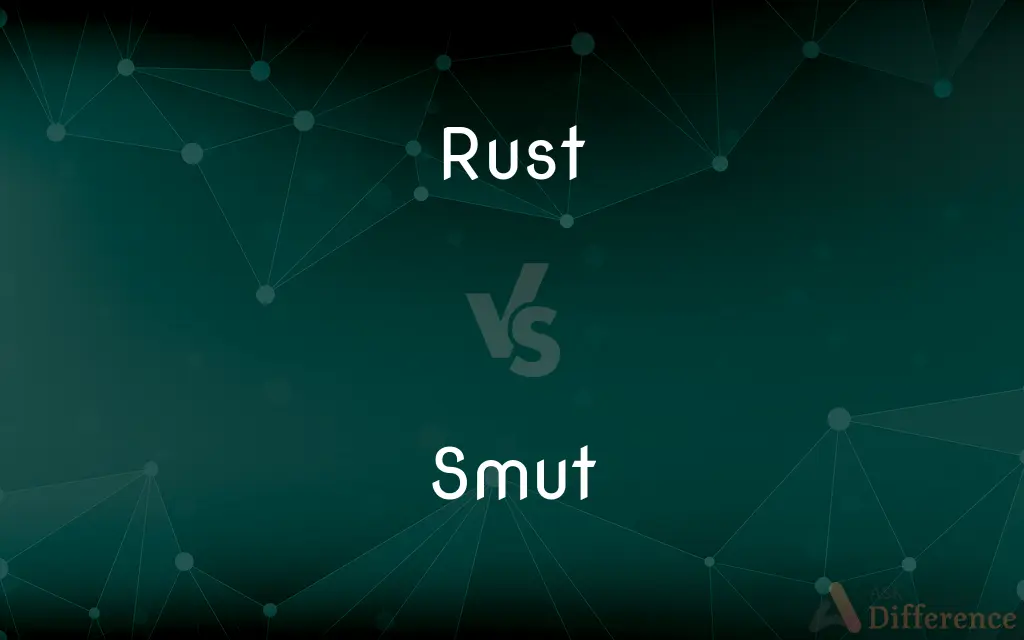Rust vs. Smut — What's the Difference?
By Tayyaba Rehman — Published on November 24, 2023
Rust is the reddish or orange coating that forms on the surface of iron when exposed to air and moisture, whereas Smut refers to a type of fungus affecting plants or a term for obscene material. Both have diverse contextual uses.

Difference Between Rust and Smut
Table of Contents
ADVERTISEMENT
Key Differences
Rust is essentially an iron oxide, a usually red oxide formed by the redox reaction of iron and oxygen in the presence of water or air moisture. Numerous forms of rust are distinguishable both visually and by spectroscopy, and form under different circumstances. Smut, on the other hand, can denote a type of fungal disease affecting plants, especially cereals, or it can refer to obscene or lascivious books, articles, pictures, films, or jokes.
Rust typically occurs in any conditions where metal, particularly iron and steel, is exposed to oxygen and moisture for an extended period of time. This corrosive process gradually degrades the metal, compromising its strength and integrity. Smut, as a plant fungus, is characterized by dark, smutty (sooty) masses of spores noticeable on the affected plant, often resulting in crop damage and loss. As an indecent material, smut appeals to prurient interests, often via media like magazines, films, or internet content.
One notable aspect is the mitigation measures adopted for handling rust and smut. Rust is often managed via methods like rustproofing, which involves applying coatings and paint, using inhibitors, and keeping the material dry. In contrast, controlling smut, the fungus, generally involves utilizing resistant crop varieties, implementing crop rotation, or applying fungicides to prevent its spread and manifestation. Handling smut, when referring to obscene material, involves regulatory, legal, and potentially technological measures to restrict access, distribution, and production.
In the context of economic and social impact, rust and smut have different spheres of influence. Rust can lead to significant economic costs due to the degradation of metallic structures, machinery, and infrastructures, necessitating repair, replacement, and maintenance. Smut, in an agricultural context, affects crop yield and quality, impacting farmers’ livelihoods and potentially affecting food supply chains. As a term for obscene content, smut can have various social, moral, and potentially legal implications, which can impact societal norms and values.
Comparison Chart
Definition
An oxide forming on iron/steel.
A type of fungus or obscene material.
ADVERTISEMENT
Context of Use
Primarily related to metals.
Related to plants or obscene content.
Impact
Causes degradation of metal materials.
Affects crops or denotes lewd material.
Management
Mitigated by rustproofing methods.
Managed by fungicides or legal measures.
Economic Implication
Affects infrastructure and machinery.
Impacts agriculture or media distribution.
Compare with Definitions
Rust
As a verb, rust refers to corrode or be corroded.
The metal will rust if left outdoors.
Smut
As a verb, smut means to mark or affect with small particles of dirt or soot.
The walls were smutted by the smoke from the fire.
Rust
Rust implies gradual decay due to neglect or usage.
The unused tools began to rust in the shed.
Smut
A particle of dirt or soot
"the smoke and flames blowing from the lantern which peppered him with large black smuts" (Joyce Cary).
Rust
Any of various powdery or scaly reddish-brown or reddish-yellow hydrated ferric oxides and hydroxides formed on iron and iron-containing materials by low-temperature oxidation in the presence of water.
Smut
A smudge made by soot, smoke, or dirt.
Rust
Any of various metallic coatings, especially oxides, formed by corrosion.
Smut
See smut fungus.
Rust
A stain or coating resembling iron rust.
Smut
To blacken or smudge, as with smoke or grime.
Rust
Deterioration, as of ability, resulting from inactivity or neglect.
Smut
To affect (a plant) with smut fungus.
Rust
Rust fungus.
Smut
To be or become blackened or smudged.
Rust
A plant disease caused by a rust fungus, characterized by reddish or brownish spots on leaves, stems, and other parts.
Smut
(uncountable) Soot.
Rust
A strong brown.
Smut
(countable) A flake of ash or soot.
Rust
To become corroded.
Smut
(uncountable) Obscene language; ribaldry; obscenity.
Rust
To deteriorate or degenerate through inactivity or neglect
My golf game has rusted from all those years of not playing.
Smut
Any of a range of fungi, mostly Ustilaginomycetes, that cause plant disease in grasses, including cereal crops; the disease so caused.
Rust
To become the color of rust.
Smut
(mining) Bad, soft coal containing earthy matter, found in the immediate locality of faults.
Rust
(Botany) To develop a disease caused by a rust fungus.
Smut
(ambitransitive) To stain (or be stained) with soot or other dirt.
Rust
To corrode or subject (a metal) to rust formation.
Smut
(transitive) To taint (grain, etc.) with the smut fungus.
Rust
To impair or spoil, as by misuse or inactivity.
Smut
(intransitive) To become tainted by the smut fungus.
Rust
To color (something) a strong brown.
Smut
(transitive) To clear of the smut fungus.
To smut grain for the mill
Rust
The deteriorated state of iron or steel as a result of moisture and oxidation.
The rust on my bicycle chain made cycling to work very dangerous.
Smut
Foul matter, like soot or coal dust; also, a spot or soil made by such matter.
Rust
A similar substance based on another metal (usually with qualification, such as "copper rust").
Aerugo. Green or blue-green copper rust; verdigris. (American Heritage Dictionary, 1973)
Smut
Bad, soft coal, containing much earthy matter, found in the immediate locality of faults.
Rust
A reddish-brown color.
Smut
An affection of cereal grains producing a swelling which is at length resolved into a powdery sooty mass. It is caused by parasitic fungi of the genus Ustilago. Ustilago segetum, or U. Carbo, is the commonest kind; that of Indian corn is Ustilago maydis.
Rust
A disease of plants caused by a reddish-brown fungus.
Smut
Obscene language; ribaldry; obscenity.
He does not stand upon decency . . . but will talk smut, though a priest and his mother be in the room.
Rust
(philately) Damage caused to stamps and album pages by a fungal infection.
Smut
To stain or mark with smut; to blacken with coal, soot, or other dirty substance.
Rust
(intransitive) To oxidize, especially of iron or steel.
The patio furniture had rusted in the wind-driven spray.
Smut
To taint with mildew, as grain.
Rust
(transitive) To cause to oxidize.
The wind-driven spray had thoroughly rusted the patio furniture.
Smut
To blacken; to sully or taint; to tarnish.
Rust
(intransitive) To be affected with the parasitic fungus called rust.
Smut
To clear of smut; as, to smut grain for the mill.
Rust
To (cause to) degenerate in idleness; to make or become dull or impaired by inaction.
Smut
To gather smut; to be converted into smut; to become smutted.
Rust
(intransitive) Of a black cat or its fur, to turn rust-coloured following long periods of exposure to sunlight.
It's very common for black cats to rust during the summer.
Smut
To give off smut; to crock.
Rust
The reddish yellow coating formed on iron when exposed to moist air, consisting of ferric oxide or hydroxide; hence, by extension, any metallic film of corrosion.
Smut
A black colloidal substance consisting wholly or principally of amorphous carbon and used to make pigments and ink
Rust
A minute mold or fungus forming reddish or rusty spots on the leaves and stems of cereal and other grasses (Trichobasis Rubigo-vera), now usually believed to be a form or condition of the corn mildew (Puccinia graminis). As rust, it has solitary reddish spores; as corn mildew, the spores are double and blackish.
Smut
Destructive diseases of plants (especially cereal grasses) caused by fungi that produce black powdery masses of spores
Rust
That which resembles rust in appearance or effects.
Sacred truths cleared from all rust and dross of human mixtures.
Smut
Any fungus of the order Ustilaginales
Rust
To contract rust; to be or become oxidized.
If gold ruste, what shall iron do?
Our armors now may rust.
Smut
Make obscene;
This line in the play smuts the entire act
Rust
To be affected with the parasitic fungus called rust; also, to acquire a rusty appearance, as plants.
Smut
Stain with a dirty substance, such as soot
Rust
To degenerate in idleness; to become dull or impaired by inaction.
Must I rust in Egypt? never moreAppear in arms, and be the chief of Greece?
Smut
Become affected with smut;
The corn smutted and could not be eaten
Rust
To cause to contract rust; to corrode with rust; to affect with rust of any kind.
Keep up your bright swords, for the dew will rust them.
Smut
Affect with smut or mildew, as of a crop such as corn
Rust
To impair by time and inactivity.
Smut
Smut refers to a type of fungus causing a disease in cereals.
The wheat field was ruined by a widespread smut infection.
Rust
A red or brown oxide coating on iron or steel caused by the action of oxygen and moisture
Smut
Smut is a term denoting obscene or lascivious books, pictures, or jokes.
The legislator sought to regulate the distribution of smut.
Rust
A reddish-brown discoloration of leaves and stems caused by a rust fungus
Smut
Smut can refer to a small flake of soot or dirt.
She brushed a piece of smut off the white tablecloth.
Rust
The formation of reddish-brown ferric oxides on iron by low-temperature oxidation in the presence of water
Smut
Smutty describes something soiled with smut or having the characteristics of smut.
The comedian told a smutty joke that made the audience groan.
Rust
Any of various fungi causing rust disease in plants
Rust
Become destroyed by water, air, or an etching chemical such as an acid;
The metal corroded
The pipes rusted
Rust
Cause to deteriorate due to the action of water, air, or an acid;
The acid corroded the metal
The steady dripping of water rusted the metal stopper in the sink
Rust
Become coated with oxide
Rust
Of the color of rust
Rust
Rust is the flaky, reddish-brown oxide formed on iron or steel by oxidation.
The old car was covered in rust after years of neglect.
Rust
Rust can symbolize a decay of skills or ability due to inactivity.
After months without practice, she felt her skills were beginning to rust.
Rust
Rust color refers to a reddish-brown color.
The sunset painted the sky in shades of rust and orange.
Common Curiosities
What are the economic implications of rust?
Rust can cause degradation of infrastructure and machinery, necessitating costly repairs, maintenance, or replacements.
Is rust harmful to humans?
While rust itself isn't typically harmful, tetanus-causing bacteria can reside in rusty objects, making rusty puncture wounds potentially dangerous.
Can rust be prevented or removed?
Yes, rust can be prevented with rustproofing techniques and removed using various methods like scraping, using rust removers, or employing electrolysis.
Can all metals rust?
No, rust specifically refers to the oxidation of iron or its alloys. Other metals may corrode but it is not referred to as rusting.
Is smut illegal?
Laws regarding smut, as obscene material, vary widely, with some jurisdictions having strict regulations against its production and distribution, while others may have more lenient approaches.
How is smut in plants controlled?
Smut can be controlled using methods like employing resistant crop varieties, using fungicides, and practicing crop rotation to break the fungal life cycle.
What is smut in the context of plants?
Smut refers to a group of fungi that infects plants, particularly grains, creating dark, soot-like spore masses and potentially damaging crops.
How does smut fungus affect the agricultural industry?
Smut fungus can significantly impact the agricultural industry by reducing crop yields and quality, potentially causing economic losses for farmers and affecting food supply chains.
What causes rust on metal surfaces?
Rust is caused by the reaction of iron and oxygen in the presence of water or air moisture.
What does smut refer to in a non-agricultural context?
In a non-agricultural context, smut commonly refers to obscene or lewd materials, like books, pictures, or jokes.
Can rust occur in environments without water?
Rust generally requires moisture (water or high humidity) to form, so it's less likely to occur in completely dry environments.
Can smut have implications on human health?
While smut in plants primarily affects the crops, inhalation of spores in large quantities or consuming severely infected crops might pose health risks, although generally, it is not considered dangerous to humans.
How does smut affect the plants it invades?
Smut fungi disrupt normal plant growth, diverting nutrients to create spore masses, which can cause deformities, hinder growth, and even kill the plant in severe cases.
Can rust and smut occur together in a scenario?
Rust and smut can co-occur in scenarios where metallic agricultural tools or structures are exposed to elements leading to rust, and crops in the same environment are exposed to smut fungi, but they don’t cause each other.
Are there different types of rust?
Yes, there are various forms of rust, including red rust (Fe2O3), green rust, and several other variants, which form under different conditions and have distinct appearances.
Share Your Discovery

Previous Comparison
Petrol vs. LPG
Next Comparison
AV Valves vs. Semilunar ValvesAuthor Spotlight
Written by
Tayyaba RehmanTayyaba Rehman is a distinguished writer, currently serving as a primary contributor to askdifference.com. As a researcher in semantics and etymology, Tayyaba's passion for the complexity of languages and their distinctions has found a perfect home on the platform. Tayyaba delves into the intricacies of language, distinguishing between commonly confused words and phrases, thereby providing clarity for readers worldwide.












































